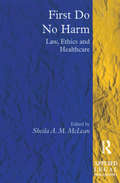- Table View
- List View
Firearms Law and the Second Amendment
by Nicholas J. Johnson George A. Mocsary Michael P. O'SheaFirearms Law and the Second Amendment: Regulation, Rights and Policy is the first traditional law school casebook to cover the subject, and the only casebook that provides a comprehensive treatment since the Supreme Court affirmed the constitutional right to private firearms in 2008 and extended that right to constrain state action in 2010. From the development of the constitutional right to keep and bear arms through laws governing possession and use of private firearms, this casebook covers all aspects of firearms law, policy and regulations. It is ideally suited to law school courses on firearms law, the Second Amendment, criminal law, jurisprudence and legal history. Key features: The first traditional law school casebook to cover firearms law . Comprehensive coverage of all aspects of firearms law, from its colonial origins to present-day debates. Ideally suited for a dedicated law school course in firearms law and the Second Amendment. Flexible organization makes this book, as well as individual chapters, well-suited for use in courses on constitutional law, criminal law, jurisprudence and legal history . Supplemental materials on the website - including select student papers - will be a continuing research source tracking the most current developments in firearms law, regulation, and policy. A Teacher's Manual provides solid support for presentation, discussions and questions.
Firearms, the Law, and Forensic Ballistics
by Tom WarlowWhile gun design has undergone only minimal change over the centuries, investigative tools surrounding firearm use have grown significantly in sophistication. Now in its third edition, Firearms, the Law, and Forensic Ballistics has been updated to reflect recently published research and new technology developed since the last volume. Beginning with
Firearms: Global Perspectives on Consequences, Crime and Control
by Helen PooleFirearms: Global Perspectives on Consequences, Crime and Control explores the many dimensions of the illicit use of firearms across the globe, including legal, social science, technical and research perspectives on the issue. Employing a global set of case studies, the book introduces students to the core issues related to the trafficking, manufacture, availability and criminal use of firearms, as well as firearms markets, national and international legal frameworks to control firearms, the response of the criminal justice system, the role of civil society in affecting change and how students can get involved through research and action. Firearms will be of great interest to students of Criminology, Criminal Justice, International Law, International Development, Policing, Crime Control and Community Safety.
Firebrand: A Tobacco Lawyer's Journey
by Joshua Knelman"You&’ll inhale this tell-all book about the tobacco industry and never look at a No Smoking sign the same way again!"—Margaret Atwood, via TwitterMad Men meets Bad Blood in this addictive, behind-the-scenes globe-trotting narrative of moral ambiguity, law, public policy, and big tobacco.&“Given everything the lawyer knew up to that point about smoking, as far as he could tell, cigarettes shouldn&’t even have been available as a mass market product...&”It&’s the start of the new millennium and a young lawyer is recruited to work for an unnamed multinational company. It isn&’t until his second interview that the product the company produces is revealed to him: cigarettes. Possibly the most controversial consumer product in human history: seductive, addictive, and deadly—yet completely legal. Over the next decade, he travels the world as he works as legal counsel to help successfully market cigarettes in dozens of countries. Firebrand ventures into the heart of the tobacco industry and the icy paradoxes of capitalism, each chapter a counterintuitive lesson on how cigarette companies—the target of increasingly intense anti-smoking campaigns and government regulations, including the 1964 Surgeon General&’s Report and 200-billion-dollar debt of the 1998 Master Settlement Agreement—continue to pivot and thrive in the 21st century, inhaling profits from their one billion smokers worldwide. As Mad Men did for the alcohol-fueled, oversexed, corrupt world of New York advertising, Firebrand does for the even more despised world of big tobacco, in an addictive, behind-the-scenes piece of storytelling. The lawyer&’s work takes him from manufacturing factories to hocking &“sticks&” at UK corner store counters; from tacky resorts in Spain and pirate city-states to luxury hotels and Grand Prix events across European and Asian cities. A contemporary tale of our ambiguous times, told with character-based drive and dry humour, Firebrand is a grand tour of the compelling paradoxes of globalization and corporate culture, shrink-wrapped in an engrossing narrative of a morally dubious yet completely legal enterprise.&“This is storytelling at its best. Wry observation, compelling narrative, fascinating characters, page-turning writing, and an age-old question driving it all...&”—Joel Bakan, author of The New Corporation: How &‘Good&’ Corporations are Bad for Democracy
Firefighters (Jobs People Do)
by Mary MeinkingFirefighters are the heroes we need in times of emergency. Readers will learn all the roles firefighters have, the tools they use, and how people get this exciting, fast-paced job.
Firefighters: Their Lives in Their Own Words
by Dennis SmithAn unforgettable journey through the daily lives of the brave men and women who have made saving lives their profession. Dennis Smith, author ofReport from Engine Co. 82, traveled across the country talking to dozens of America’s firefighters to put together this powerful collection of their own descriptions of their most dramatic and intense experiences on the job. Their stories, compiled here, are timeless testimonies to the human capacity for heroism and nobility. Focusing on the most courageous firefighters, from those who have been decorated for heroism to those who have been seriously injured,Firefighterspresents the extraordinarily rich and rugged voices of men and women who fight urban building fires, who battle sweeping forest fires, who perform emergency rescues, and who face extreme danger and risk as part of their everyday lives. Sometimes brave, sometimes funny, sometimes bittersweet or filled with anger, these voices combine to makeFirefightersboth a riveting adventure drama and a moving chronicle of American heroism at its finest.
Firestorm: American Film in the Age of Terrorism
by Stephen PrinceIt was believed that September 11th would make certain kinds of films obsolete, such as action thrillers crackling with explosions or high-casualty blockbusters where the hero escapes unscathed. While the production of these films did ebb, the full impact of the attacks on Hollywood's creative output is still taking shape. Did 9/11 force filmmakers and screenwriters to find new methods of storytelling? What kinds of movies have been made in response to 9/11, and are they factual? Is it even possible to practice poetic license with such a devastating, broadly felt tragedy?Stephen Prince is the first scholar to trace the effect of 9/11 on the making of American film. From documentaries like Fahrenheit 9/11 (2004) to zombie flicks, and from fictional narratives such as The Kingdom (2007) to Mike Nichols's Charlie Wilson's War (2007), Prince evaluates the extent to which filmmakers have exploited, explained, understood, or interpreted the attacks and the Iraq War that followed, including incidents at Abu Ghraib. He begins with pre-9/11 depictions of terrorism, such as Alfred Hitchcock's Sabotage (1936), and follows with studio and independent films that directly respond to 9/11. He considers documentary portraits and conspiracy films, as well as serial television shows (most notably Fox's 24) and made-for-TV movies that re-present the attacks in a broader, more intimate way. Ultimately Prince finds that in these triumphs and failures an exciting new era of American filmmaking has taken shape.
Firm Ambitions (Attorney Rachel Gold Mysteries #0)
by Michael A. KahnStorm Kayama and her partner Ian Hamlin are excited to get away from Honolulu for the weekend. While they will both be doing work on this trip, it is a much needed break from the routine. Storm is supposed to check on an old friendas diabetic son. This should be easy, but when the boyas mother, Jenny Williams, turns up dead, Storm must find the boy before the murderers do.In the meantime, Ian is investigating the disappearance of Brock Liu, the son of an Oaahu shipping magnate. Are Jenny Williamsa death and Brock Liuas disappearance related? Or are they both linked to an older unsolved crime?
Firmengründung in den USA: Ein Handbuch für die Praxis
by Nikolaus Buch Sven C. OehmeVon Praktikern für Praktiker geschrieben: Die Autoren verfügen über langjährige Erfahrungen mit der Gründung und dem Aufbau von Niederlassungen in den USA. Sie vereinen die Sichtweisen von Handelsattaché, Rechtsanwalt und Unternehmensberater, so dass die verschiedenen Aspekte einer erfolgreichen Unternehmensgründung in den USA ausführlich besprochen und analysiert werden. Speziell aufbereitete Checklisten und Fallbeispiele helfen, kostenintensive Fallen beim Start-up in den USA zu vermeiden.
First Amendment (Aspen Casebook Series)
by Erwin ChemerinskyBuy a new version of this textbook and receive access to the Connected eBook on Casebook Connect, including lifetime access to the online ebook with highlight, annotation, and search capabilities. Access also includes an outline tool and other helpful resources. Connected eBooks provide what you need most to be successful in your law school classes. From the same author of the highly successful Constitutional Law, Seventh Edition, a leading casebook in the field, The First Amendment by Erwin Chemerinsky provides a comprehensive and accessible review of speech and religion jurisprudence under the First Amendment (Chapters 9 and 10 of Constitutional Law, Seventh Edition). With its concise, yet comprehensive presentation, The First Amendment presents the law solely through case excerpts and the author’s own essays, which make the law more readily understood through context and background information. The text’s flexible organization accommodates a variety of course structures so that no chapter assumes that students have read preceding material.
First Amendment Institutions
by Paul HorwitzAddressing a host of hot-button issues, from the barring of Christian student groups and military recruiters from law schools and universities to churchesâ immunity from civil rights legislation in hiring and firing ministers, Paul Horwitz proposes a radical reformation of First Amendment law. Arguing that rigidly doctrinal approaches canât account for messy, real-world situations, he suggests that the courts loosen their reins and let those institutions with a stake in First Amendment freedoms do more of the work of enforcing them. Universities, the press, libraries, churches, and various other institutions and associations are a fundamental part of the infrastructure of public discourse. Rather than subject them to ill-fitting, top-down rules and legal categories, courts should make them partners in shaping public discourse and First Amendment law, giving these institutions substantial autonomy to regulate their own affairs. Self-regulation and public criticism should be the key restraints on these institutions, not judicial fiat. Horwitz suggests that this approach would help the law enhance the contribution of our âFirst Amendment institutionsâ to social and political life. It would also move us toward a conception of the state as a participating member of our social framework, rather than a reigning and often overbearing sovereign. First Amendment Institutions offers a new vantage point from which to evaluate ongoing debates over topics ranging from campaign finance reform to campus hate speech and affirmative action in higher education. This book promises to promoteâand provokeâimportant new discussions about the shape and future of the First Amendment.
First Amendment: Cases Controversies and Contexts
by Ruthann RobsonFirst Amendment Cases Controversies and Contexts 2nd Edition
First Among Equals: The Supreme Court in American Life
by Kenneth W. StarrAnalysis of the Supreme Court since Earl Warren left the Court in 1969.
First Among Equals: The Supreme Court in American Life
by Kenneth W. StarrOne of America's most controversial legal figures and author of The Starr Report offers a revealing look at the inner workings of today's Supreme Court. Consisting of only nine members, each appointed by the president to serve a life-long term, the U.S. Supreme Court exerts an extensive and pervasive influence over America, handing down decisions that set the legal standards by which every American lives. Now,Kenneth Starr, most famous for his investigation of President Clinton, examines the delicate balance of personalities and judicial philosophies that makes up this esteemed body. Drawing not only on his own scholarly understanding but also on his first-hand experience arguing 25 cases before the Court, Starr traces its evolving role since the days of John Marshall, providing sharply drawn accounts of some of the most significant issues of recent years. His controversial analysis culminates in an especially provocative defense of the Court's actions in Bush vs. Gore, which decided the 2000 Presidential election in perhaps the most contentious decision in history.
First Comes Marriage: The perfect slow-burn romcom you won’t be able to put down in 2024!
by Laila RafiZafar and Reshma might be husband and wife.But now it's time to fall in love...Zafar is the perfect son. After all, he does spend his head buried in the family business and sets the right example for his younger brothers. But being the perfect husband doesn't come so easily to him...Reshma didn't expect romance when she agreed to marry Zafar. And definitely not love. But there's something just about Zafar Saeed that makes her long for the romance she reads in her books, so falling for him was easy. The only issue is that he barely acknowledges her!And when Zafar and Reshma are reluctantly swept away to beautiful Mombasa for a family wedding, avoiding each other becomes even trickier. Forced to be in close proximity, Zafar and Reshma are about to discover that sometimes falling in love comes after saying 'I do'.*Heartwarming and achingly romantic, First Comes Marriage is just the slow-burn, grumpy-sunshine romance you need to read in 2023. Perfect for fans of Sara Desai, Sonali Dev and Talia Hibbert!*
First Comes Marriage: The perfect slow-burn romcom you won’t be able to put down in 2024!
by Laila RafiZafar and Reshma might be husband and wife.But now it's time to fall in love...Zafar is the perfect son. After all, he does spend his head buried in the family business and sets the right example for his younger brothers. But being the perfect husband doesn't come so easily to him...Reshma didn't expect romance when she agreed to marry Zafar. And definitely not love. But there's something just about Zafar Saeed that makes her long for the romance she reads in her books, so falling for him was easy. The only issue is that he barely acknowledges her!And when Zafar and Reshma are reluctantly swept away to beautiful Mombasa for a family wedding, avoiding each other becomes even trickier. Forced to be in close proximity, Zafar and Reshma are about to discover that sometimes falling in love comes after saying 'I do'.*Heartwarming and achingly romantic, First Comes Marriage is just the slow-burn, grumpy-sunshine romance you need to read in 2023. Perfect for fans of Sara Desai, Sonali Dev and Talia Hibbert!*
First Day on the Job (Fountas & Pinnell LLI Purple #Level S)
by Michael Sullivan<p>First Day on the Job by Michael Sullivan, illustrated by Courtney Huddleson. <p>Bad Day! Joe Sullivan has wanted to be a small-town police officer since he was in first grade, but no small-town police officer ever had a first day like this! <p>Text Elements <p> <li>Genre: Fiction, Realistic <li>Text Structure: Narrative <li>Text Features: embedded student report; heading shows the passage of time; Readers' Theater <li>Book 35 Level S <li>2270 Total Running Words</li>
First Degree Rage: The True Story of 'The Assassin,' An Obsession, and Murder (The "Rage" True Crime Series)
by Paula MayA North Carolina Sheriff&’s Detective recounts a shocking case of domestic deception and brutal murder in this true crime chronicle. In 1993, single mom Kay Weden endured a series of senseless attacks on her family. Her son was nearly killed by a shot fired through their house. Then her elderly mother was murdered by an unknown intruder. Beyond this, Kay&’s new boyfriend, Viktor Gunnarsson, had just disappeared without warning. The handsome Swede was in the U.S. seeking political asylum after being charged with the 1986 assassination of Sweden&’s Prime Minister. With nowhere else to turn, Kay reconnected with her ex-fiancé L.C. Underwood, a police officer adept at criminal investigations. L.C. assured Kay he would get to the bottom of her terrible nightmare. But then Viktor&’s nude body was found two hours away in the Appalachian Mountains. When local Sheriff&’s Detective Paula May started investigating, she began to unravel a hair-raising case of stalking, assault, and murder.
First Do No Harm: Law, Ethics and Healthcare (Applied Legal Philosophy)
by Sheila A.M. McleanThis collection brings together essays from leading figures in the field of medical law and ethics which address the key issues currently challenging scholars in the field. It has also been compiled as a lasting testimony to the work of one of the most eminent scholars in the area, Professor Ken Mason. The collection marks the academic crowning of a career which has laid one of the foundation stones of an entire discipline. The wide-ranging contents and the standing of the contributors mean that the volume will be an invaluable resource for anyone studying or working in medical law or medical ethics.
First Platoon: A Story of Modern War in the Age of Identity Dominance
by Annie JacobsenAn urgent investigation into warfare, good, and evil in the age of biometrics, the technology that would allow the government to identify anyone, anywhere, at any time This is a story that starts off close and goes very big. The initial part of the story might sound familiar at first: It is about a platoon of mostly nineteen-year-old boys sent to Afghanistan, and an experience that ends abruptly in catastrophe. Their part of the story folds into the next: inexorably linked to those soldiers and never comprehensively reported before is the U.S. Department of Defense&’s quest to build the world&’s most powerful biometrics database, with the power to identify, monitor, catalogue, and police people all over the world. First Platoon is an American saga that illuminates a transformation of society made possible by this new technology. Part war story, part legal drama, it is about identity in the age of identification. About humanity—physical bravery, trauma, PTSD, a yearning to do right and good—in the age of biometrics, which reduce people to iris scans, fingerprint scans, voice patterning, detection by odor, gait, and more. And about the power of point-of-view in a burgeoning surveillance state. Based on hundreds of formerly classified documents, FOIA requests, and exclusive interviews, First Platoon is an investigative exposé by a master chronicler of government secrets. First Platoon reveals a post–9/11 Pentagon whose identification machines have grown more capable than the humans who must make sense of them. A Pentagon so powerful it can cover up its own internal mistakes in pursuit of endless wars. And a people at its mercy, in its last moments before a fundamental change so complete it might be impossible to take back.
First Unit Responder: A Guide to Physical Evidence Collection for Patrol Officers
by Mark R. HawthorneFirst Unit Responder: A Guide to Physical Evidence Collection for Patrol Officers is a training guide and reference for patrol officers and criminal investigators, who conduct preliminary investigations of crime scenes, to aid in identification, collection, and booking of physical evidence. Written by a veteran of 24 years of law enforcement, the book stresses the importance of understanding the critical nature of physical evidence and preservation of the crime scene as part of the case against a criminal defendant. This book is an important tool for police academies that train recruits and veteran patrol officers, as well as for students of criminal justice who seek guidelines for proper collection and handling of physical evidence.
First Year Law Students Book of Legal Secrets
by Value Bar Prep BooksDefinitions, rules, arguments, discussions and extremely informative lessons - everything needed to survive first year law school. Great for students taking Contracts Torts or Criminal law.
First, Do Less Harm: Harm Reduction as a Principle of Law and Policy (Health and Society)
by Vanessa Gruben Chelsea CoxReaders will be able to gain a deeper understanding of how different approaches to harm reduction can create a stronger foundation for more effective policies and legislation. Scholars from law and social sciences collaborate with frontline organizations as well as with individuals with lived experience to reflect diverse perspectives, and transform how society addresses substance-related challenges.Each chapter provides unique findings, drawing from examples of harm reduction strategies implemented for opioids, cannabis, and tobacco in Canada and beyond. While harm reduction has been a central aspect of the legal and policy responses to all three substances, its application has varied significantly. First, Do Less Harm explores how the ongoing opioid crisis emphasizes the pressing need for safe consumption sites and life-saving tools like naloxone. Case studies on Canada’s legalization of cannabis highlight both the benefits and challenges of providing legal and regulated access to a drug. The volume further examines the evolving landscape of tobacco regulations where recent innovations such as vaping offer less harmful alternatives, yet raise significant concerns about youth uptake and public health. Designed for policymakers, health professionals, academics, and anyone interested in creating safer communities, this collection not only presents thought-provoking ideas but also provides inspiration to take action.
First, Do No Harm: The Dramatic Story of Real Doctors and Patients Making Impossible Choices at a Big-City Hosptial
by Lisa BelkinWhat is life worth? And what is a life worth living? <P> At a time when America faces vital choices about the future of its health care, former NEW YORK TIMES correspondent Lisa Belkin takes a powerful and poignant look at the inner workings of Hermann Hospital in Houston, Texas, telling the remarkable, real-life stories of the doctors, patients, families, and hospital administrators who must ask--and ultimately answer--the most profound and heartrendng questions about life and death.
First-Time Landlord: Your Guide to Renting out a Single-Family Home
by Janet Portman Marcia Stewart Ilona BrayThe 101 on earning rental income from a single-family home Do you own a house you’d like to rent out rather than sell? It’s a common scenario in today’s market, especially if you’ve inherited a house, are moving to another home, or are buying an investment property. And it may mean you’re about to be a first-time landlord. Follow the advice in this book to ease into your new role and earn substantial profits while avoiding costly mistakes. Learn your legal obligations. Estimate costs and profits. Choose good tenants and avoid problem ones. Make the most of valuable tax deductions. Handle repairs and property management tasks. The 5th edition is updated to cover major legal changes, in particular how the Tax Cuts and Jobs Act created pass-through deductions that can benefit landlords. Includes sample forms and budget worksheets.






















